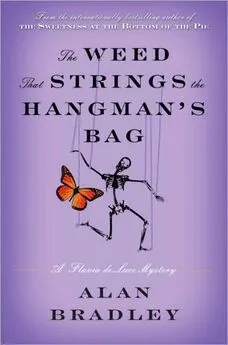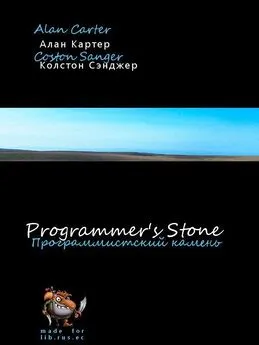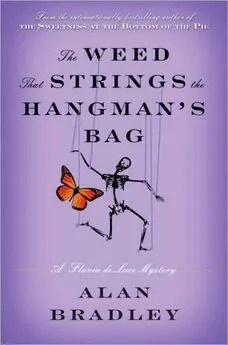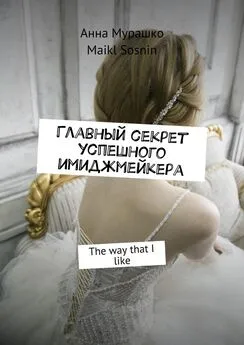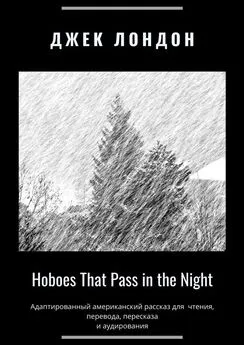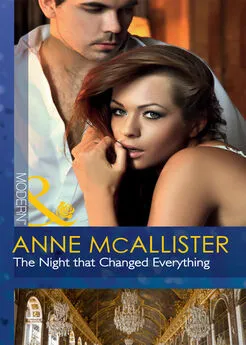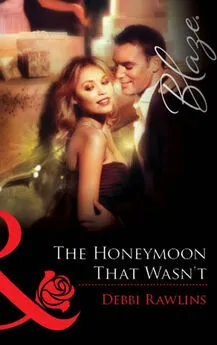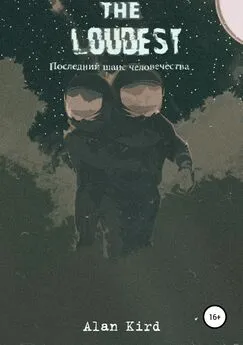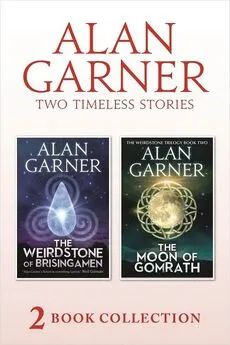Alan Bradley - The Weed That Strings the Hangman's Bag
- Название:The Weed That Strings the Hangman's Bag
- Автор:
- Жанр:
- Издательство:неизвестно
- Год:неизвестен
- ISBN:нет данных
- Рейтинг:
- Избранное:Добавить в избранное
-
Отзывы:
-
Ваша оценка:
Alan Bradley - The Weed That Strings the Hangman's Bag краткое содержание
The Weed That Strings the Hangman's Bag - читать онлайн бесплатно полную версию (весь текст целиком)
Интервал:
Закладка:
"Oh, I feel such a chump."
I turned to see the woman dabbing at her eyes and giving me a damp grin.
"I'm Nialla," she said, sticking out a hand. "Rupert's assistant."
I fought back my revulsion and gave her fingers a lightning-quick shake. As I had suspected, her hand was wet and sticky. As soon as I was decently able, I slid my own hand out of sight behind my back and wiped it on the back of my skirt.
"Assistant?" The word popped out of my mouth before I could stop it.
"Oh, I know the vicar assumed that I'm Rupert's wife. But it's not like that. Honestly! It's not like that at all."
I glanced over involuntarily at the Porson's Puppets van. She spotted it at once.
"Well, yes ... we do travel together. I suppose Rupert and I have what you might call ... a very great affection for one another. But husband and wife ... ?"
What kind of fool did she take me for? It was no more than a week since Daffy had been reading aloud to Feely and me from Oliver Twist , and I knew, as surely as I knew my own name, that this woman, Nialla, was Nancy to Rupert Porson's Bill Sikes. Didn't she realize that I'd spotted the filthy great bruise on her upper arm?
"Actually, it's such jolly fun rattling about England with Rupert. He's recognized everywhere we go, you know. Just the day before yesterday, for instance, we were playing at Market Selby when we were spotted in the post office by a fat lady in a flowerpot hat.
"'Rupert Porson!' she shrieked. 'Rupert Porson uses the Royal Mail, just like everyone else!'"
Nialla laughed. "And then she begged him for his autograph. They always do, you know. Insisted he put 'Best wishes from Snoddy the Squirrel.' When he does it that way, he always draws a couple of little nuts. She claimed she wanted it for her nephew, but I knew better. When you're on the road a lot, you develop a certain sense for these things. You can always tell."
She was prattling. If I kept quiet, it wouldn't be more than a minute before she would be confiding her size in knickers.
"Someone at the BBC told Rupert that twenty-three percent of his viewing audience is made up of childless housewives. Seems a lot, doesn't it? But there's something about The Magic Kingdom that satisfies one's innate desire for escape. That's the exact way they put it to Rupert: 'one's innate desire for escape.' Everyone needs to escape, don't they? In one way or another, I mean."
"Everyone but Mother Goose," I said.
She laughed. "Look, I wasn't pulling your leg. I am Mother Goose. At least, I am when I put on my costume. Just wait until you see it — tall witch's hat with a floppy brim and a silver buckle, a gray wig with dangling ringlets, and a great puffy dress that looks as if it once belonged to Mother Shipton. Do you know who Mother Shipton was?"
Of course I did. I knew that she was some old crone who was supposed to have lived in the sixteenth century and seen into the future, predicting, among other things, the Great Plague, the Great Fire of London, aeroplanes, battleships, and that the world would come to an end in 1881; that like those of Nostradamus, Mother Shipton's prophecies were in doggerel verse: "Fire and water shall wonders do," and all that. I also knew that there are actually still people running around loose today who believe she foresaw the use of heavy water in the making of the atomic bomb. As for myself, I didn't believe a word of it. It was nothing but a load of old tosh.
"I've heard the name," I said.
"Well, never mind. That's who I resemble when I'm all tarted up for the show."
"Brilliant," I said, not meaning it. She could see that I was a bit put off.
"What's a nice girl like you doing hanging about in a place like this?" she asked with a grin, taking in the whole of the churchyard with a wave of her hand.
"I often come here to think," I said.
This seemed to amuse her. She pursed her lips and put on an annoying, stagy voice.
"And what does Flavia de Luce think about in her quaint old country churchyard?"
"Being alone," I snapped, without meaning to be intentionally rude. I was simply being truthful.
"Being alone," she said, nodding. I could see that she was not put off by my bristling reply. "There's a lot to be said for being alone. But you and I know, don't we, Flavia, that being alone and being lonely are not at all the same thing?"
I brightened a bit. Here was someone who seemed at least to have thought through some of the same things I had.
"No," I admitted.
There was a long silence.
"Tell me about your family," Nialla said at last, quietly.
"There isn't much to tell," I said. "I have two sisters, Ophelia and Daphne. Feely's seventeen and Daffy's thirteen. Feely plays the piano and Daffy reads. Father is a philatelist. He's devoted to his stamps."
"And your mother?"
"Dead. She was killed in an accident when I was a year old."
"Good Lord!" she said. "Someone told me about a family that lived in a great rambling old mansion not far from here: an eccentric colonel and a family of girls running wild like a lot of red Indians. You're not one of them , are you?"
She saw instantly by the look on my face that I was.
"Oh, you poor child!" she said. "I'm sorry, I didn't mean to ... I mean ..."
"It's quite all right," I told her. "It's far worse than that actually, but I don't like to talk about it."
I saw the faraway look come into her eyes: the look of an adult floundering desperately to find common ground with someone younger.
"But what do you do with yourself?" she asked. "Don't you have any interests ... or hobbies?"
"I'm keen on chemistry," I said, "and I enjoy making scrapbooks."
"Do you really?" she enthused. "Fancy that! So did I, at your age. Cigarette cards and pressed flowers: pansies, mignonettes, foxgloves, delphiniums; old buttons, valentines, poems about Granny's spinning wheel from The Girl's Own Annual ... what jolly good fun it was!"
My own scrapbooks consisted of three fat purple volumes of clippings from the tide of ancient magazines and newspapers that had overflowed, and then flooded, the library and the drawing room at Buckshaw, spilling over into disused bedrooms and lumber rooms before being carted off at last to languish in damp, moldering stacks in a crypt in the cellars. From their pages, I had carefully clipped everything I could find on poisons and poisoners, until my scrapbooks were bursting at the seams with the likes of Major Herbert Rowse Armstrong, the amateur gardener and solicitor, who dispatched his wife with lovingly prepared concoctions of arsenious weed-killer; Thomas Neill Cream, Hawley Harvey Crippen, and George Chapman (remarkable, isn't it, that so many of the great poisoners' names begin with the letter C ?), who with strychnine, hyoscine, and antimony respectively, sent a veritable army of wives and other women marching to their graves; Mary Ann Cotton (see what I mean?) who, after several successful trial runs on pigs, went on to poison seventeen people with arsenic; Daisy de Melker, the South African woman with a passion for poisoning plumbers: She would first marry them, and then divorce them with a dose of strychnine.
"Keeping a scrapbook is the perfect pastime for a young lady," Nialla was saying. "Genteel ... and yet educational."
My thoughts precisely.
"My mum tossed mine in the dustbin when I ran away from home," she said with something that had it lived might have become a chuckle.
"You ran away from home?" I asked.
This fact intrigued me almost as much as her foxgloves, from which, I recalled, the vegetable alkaloid digitalin (better known to those of us who are chemists as C 36H 56O 14) could be extracted. I thought with pleasure for a moment of the several times in my laboratory I had exhausted with alcohol the leaves of foxglove plucked from the kitchen garden, watching the slender, shining needles as they crystallized, and the lovely emerald green solution that was formed when I dissolved them in hydrochloric acid and added water. The precipitated resin could, of course, be restored to its original green hue with sulfuric acid, turned light red by bromine vapor, and back to emerald green again with the addition of water. It was magical! It was also, of course, a deadly poison, and as such, was certainly far more gripping than stupid buttons and The Girl's Own Annual .
"Mmmm," she said. "Got tired of washing up, drying up, sweeping up, and dusting up, and listening to the people next door throwing up; tired of lying in bed at night, listening for the clatter of the prince's horse on the cobblestones."
I grinned.
"Rupert changed all that, of course," she said. "'Come with me to the Doorway of Diarbekir,' he told me. 'Come to the Orient and I will make you a princess in liquid silks and diamonds the size of market cabbages.'"
"He did?"
"No. What he actually said was, 'My bloody assistant's run out on me. Come with me to Lyme Regis at the weekend and I'll give you a guinea, six square meals, and a bag to sleep in. I'll teach you the art of manipulation,' he said, and I was bloody fool enough to think he was talking about puppets."
Before I had time to ask for details, she had jumped to her feet and dusted off her skirt.
"Speaking of Rupert," she said, "we'd better go in and see how he and the vicar are getting on. It's ominously quiet in the parish hall. Do you suppose they might already have murdered one another?"
Her flowered dress swished gracefully off among the tombstones, and I was left to trot doggedly along in her wake.
Inside, we found the vicar standing in the middle of the hall. Rupert was up on the platform, center stage, hands on hips. Had he been taking a curtain call at the Old Vic, the lighting could not have been more dramatic. As if dispatched by Fate, an unexpected ray of sunlight shone in through a stained-glass window at the rear of the hall, fixing Rupert's upturned face dead center in its round golden beam. He struck a pose, and began spouting Shakespeare: "
When my love swears that she is made of truth,
I do believe her though I know she lies,
That she might think me some untutored youth,
Unlearned in the world's false subtleties.
Thus vainly thinking that she thinks me young,
Although she knows my days are past the best,
Simply I credit her false-speaking tongue:
On both sides thus is simple truth suppressed."
As the vicar had mentioned, the acoustics of the hall were quite remarkable. The Victorian builders had made its interior a conch shell of curved, polished wood paneling that served as a sounding board for the faintest noise: It was like being inside a Stradivarius violin. Rupert's warm, honey-sweet voice was everywhere, wrapping us all in its rich resonance:
"But wherefore says she not she is unjust?
And wherefore say not I that I am old?
O love's best habit is in seeming trust,
And age in love, loves not to have years told.
Therefore I lie with her, and she with me,
And in our faults by lies we flattered be.
"Can you hear me now, vicar?"
The spell was instantly broken. It was as if Laurence Olivier had tossed "Woof! Woof! Testing ... one ... two ... three," into the middle of "To be, or not to be."
"Brilliant!" the vicar exclaimed.
What surprised me most about Rupert's speech was that I knew what he was saying. Because of the nearly imperceptible pause at the end of each line, and the singular way in which he illustrated the shades of meaning with his long white fingers, I understood the words. Every single one of them.
Читать дальшеИнтервал:
Закладка:
